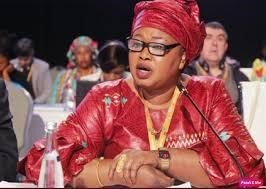Banjul Mayor Rohey Malick Lowe on Tuesday made a striking declaration before the Local Government Commission of Inquiry, stating, “I don’t think mayors in The Gambia have power,” as she sought to distance herself from key decisions over financial and administrative matters during her tenure.
The Commission, set up to probe the administrative and financial activities of local government councils from May 2018 to January 2023, admitted into evidence a six-page written statement submitted by the mayor and dated March 5, 2025. Mayor Lowe, who has led the Banjul City Council (BCC) since 2018, faced questions surrounding her authority, knowledge of financial regulations, and the procedures under which nominated councillors were appointed.
One of the central themes of her testimony was her limited control over council expenditures. Asked by Lead Counsel Patrick Gomez who holds the power to authorize spending at BCC, Lowe replied, “The CEO. He is the accounting officer.” When pressed on whether she has any role in the expenditure process, she said, “I only advise,” adding that the CEO and other administrative officials implement spending decisions.
“The CEO has the powers to make expenditure. He can choose not to adhere to my advice. I can tell him to do something, and he says no,” Lowe testified. When Gomez pointed out that the law provides the mayor with powers as well, she countered, “I do not think mayors in The Gambia have power.”
“The mayor cannot discipline, promote, demote or take any decision against any person. The mayor cannot spend anything,” she said. Her testimony painted a picture of an elected official sidelined from core administrative functions and exposed deep ambiguities in the power structure of local councils.
The lead counsel pressed further on her understanding of financial governance. When asked whether she was familiar with the Finance and Audit Act and the Financial Manual, the mayor acknowledged limited knowledge. “I do not concentrate on them too much because they deal with finance, administration and audit,” she said.
“By your understanding, are you saying these are for the finance and administration only?” Gomez asked.
“We need them, but they need it more than us,” Lowe answered.
“Can you explain what you mean by that?” Gomez pressed.
“When you say Finance and Audit Act, it is about money,” Lowe responded.
“Is that all?” Gomez asked.
“Yes. I am not a master in that,” the mayor replied.
The Commission also inquired about her role in nominating councillors. She testified that when she assumed office in 2018, BCC had 13 councillors—nine elected and four nominated. She said the nominated councillors were Anne Secka, who represented social affairs; Fintong Njie, women’s representative; Abdoulie Krubally, representing the youth; and Basiru Ndow, representing the business community.
“I nominated them,” Lowe said. However, moments later, she expressed uncertainty about how the nomination process had been carried out. Specifically, she claimed that the youth representative was nominated by the youth of Banjul and not directly by her. The Commission requested that she produce the letter of nomination from the youth constituency.
She further testified that the Ministry of Local Government confirmed the nominations, but she could not provide documentation to prove this. The Commission instructed her to submit the Ministry’s letter of confirmation.
Mayor Lowe was also asked about the legislative frameworks she relies on to guide the council’s work. She said she relies primarily on the Local Government Act and “the good practices of former mayors.”
When pressed to elaborate on those “good practices,” she cited community-oriented programs such as donations to religious groups, scholarships, and support for sports activities. “There is usually a budget line for this,” she added, though she did not clarify the process by which these budget lines are allocated or monitored.
The inquiry remains ongoing, with a focus on uncovering procedural weaknesses, verifying the legality of administrative decisions, and proposing solutions to improve governance, transparency, and accountability in local councils.




















